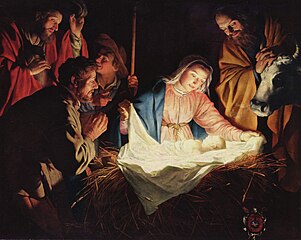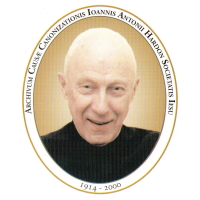
“You shall bring forth a Son, and you shall call His name Jesus” (Luke 1:31).
by Fr. John A. Hardon, S.J.
Most people take for granted that we number the years as we do. This year is 1990 A.D. But behind the number is not only a fact of history; it is the turning point of history. It separates two ages in the annals of the human race: “Before Christ” (B.C.) and “in the year of the Lord” (A.D.), since the birth of Jesus Christ.
There is more than passing value in asking ourselves what do we mean when we say that Christmas Day literally divides two eras of mankind: the centuries before Bethlehem and the now almost two millennia since Mary gave birth to her Son, wrapped Him in swaddling clothes and laid Him in a manger.
No one has written more eloquently than St. Paul about the condition of the human race before the coming of Christ. Both Jews and Greeks were all under sin.
“There is not one just man; there is none who understands; there is none who seeks after God.
All have gone astray together; they have become worthless. There is none who does good, no, not even one. Their throat is an open sepulcher; with their tongues they have dealt deceitfully. The venom of asps is beneath their lips; their mouth is full of cursing and bitterness. Their feet are swift to shed blood; destruction and misery are in their ways. And the path of peace they have not known. There is no fear of God before their eyes.” (Romans 3:10-18).
All that we know about the pre-Christian world verifies this strong language of the Apostle. Abortion and infanticide were legalized. Ambition, greed and lust were glorified. The world before Christ was a world steeped in sin.
God became man and came into the world to redeem the world from sin. Any other estimate of Christmas Day is not Christian. It was because He wanted to free us from the slavery of sin and give us the freedom of the children of God, that God was born at Bethlehem.
At the Annunciation, the angel told Our Lady, “You shall bring forth a Son, and you shall call His name Jesus” (Luke 1:31). Some time later the angel explained to Joseph not to worry about Mary being with child because “that which is begotten in her is of the Holy Spirit. She will bring forth a Son, and you are to name Him Jesus, because He shall save His people from their sins” (Matthew 1:20-21)
The very name Jesus means Savior, which for the believing Jews before Christ meant that the Messiah would deliver a fallen human race from slavery to sin.
The experience of liberation from sin is peace. This is what Zacharias, the father of John the Baptist, said about Christ, “the Orient from on high who has visited us, to shine on those who sit in darkness and in the shadow of death, to guide our feet into the way of peace” (Luke 1:78-79). This is also what the angels promised to the shepherds at Bethlehem. Because the “Savior has been born to you,” there will therefore be “peace on earth among men of good will” (Luke 2:14).
The advent of The Son of God in human flesh has changed the world, for those who believe.
Because of His birth at Bethlehem, we now have access to the peace of God in a way never before available, through the sacrament of reconciliation.
Because of His birth at Bethlehem, we now have the assurance of God’s friendship, through the sacrament of the Eucharist in which we receive the same Jesus whom Mary brought forth on Christmas Day.
Because of His birth at Bethlehem, we now have available the fullness of divine truth through the Church which the Son of Mary established to teach us what we must know to reach our eternal destiny.
Because of His birth at Bethlehem we now can tap the resources of divine power which comes from Christ, to enable us to live up to the humanly impossible demands He places on those who are called by His name.
All of this and more has come into the world through the coming of Christ. But sadly not everyone has this peace of divine forgiveness, or joy of Christ’s friendship, or conviction of possessing the truth, or the strength of coping with the trials of life.
As we approach the end of the second millennium of Christian history, we see widespread conflict between people, which is the result of disturbance within people. We see broken treaties, broken marriages, broken families and broken vows, which are the result of broken friendship with God.
So we ask, where is this peace that was promised at Bethlehem? Where? In the hearts of those who believe.
After the shepherds heard the angel’s directive, “they went with haste” as they were told. They found Mary and Joseph and the babe lying in the manger. “And when they had seen, they understood what had been told them concerning this child” (Luke 2:16-17).
Their simple faith gave them an understanding of Christ’s living presence on earth. Our faith in His continued presence in our midst will provide us, too, with an experience of that peace which only He, and not the world, can give. It is the tranquillity of a mind that sees divine order in a world of turmoil. It is the happiness of soul that comes to those who, like Mary, ponder on God’s mysterious ways but never question His divine purpose in every event in their lives.
Challenge
Vol. 17 – #3, December 1990, p.3
Copyright © 1998 Inter Mirifica
